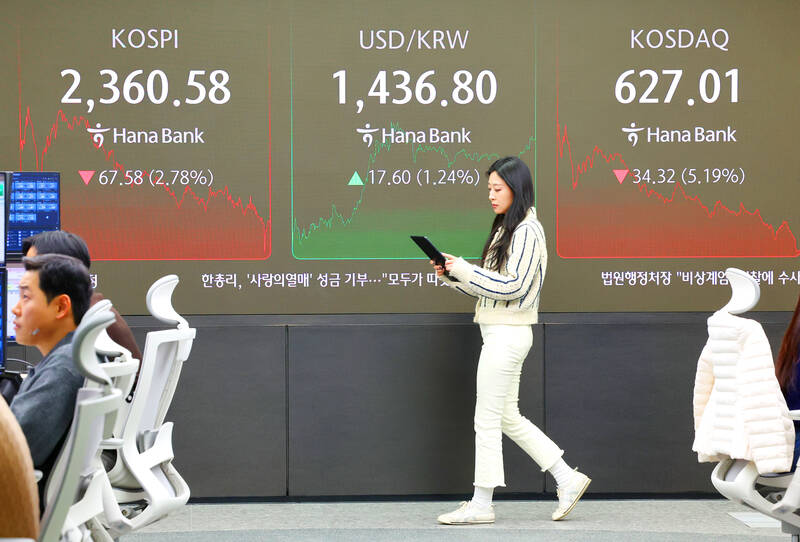South Korean stocks tumbled and the won approached its weakest level since 2009 following a weekend of political turmoil that left investors bracing for a period of heightened volatility.
The benchmark KOSPI dropped 2.8 percent, and the small-cap KOSDAQ index slumped more than 5 percent to its lowest since April 2020. The won fell about 1 percent against the US dollar, heading toward levels reached in the immediate aftermath of South Korean President Yoon Suk-yeol’s botched imposition of martial law early last week.
The main opposition party has said it would push quickly for another vote. While officials in Seoul are pulling out all the stops to prevent a market meltdown, uncertainties over the country’s leadership have cast a pall on sentiment.

Photo: EPA-EFE
“The possibility of the worst-case scenario for the KOSPI has increased,” Daishin Securities Co strategist Lee Kyoung-min said. “Even at a small development, the KOSPI can wobble because of accumulated fatigue, disappointment, extremely dented investor sentiment and supply and demand situations.”
With Yoon facing intense pressure to resign, ruling People Power Party leader Han Dong-hoon on Sunday said South Korean Prime Minister Han Duck-soo would manage the nation’s affairs while his party prepares an orderly exit plan for the president.
Opposition lawmakers slammed the decision as unconstitutional and thousands of people took to the streets to protest.
The standoff could not have come at a worse time for local markets. The KOSPI gauge and the won were among Asia’s worst performers this year even before the martial law fiasco.
Investors were pinning their hopes on the country’s leadership to navigate an uncertain global trade environment following US president-elect Donald Trump’s election win.
The “Value-Up” initiative — a program to improve corporate governance and shareholder returns — was also in need of a stronger push to reinvigorate the flagging stock market.
Financial authorities would mobilize “every possible measure” to minimize the impact on the economy and closely monitor its financial markets around the clock, a joint ministerial statement released yesterday said.
They plan to launch a 300 billion won (US$210 million) fund next week to buy “Value-Up” stocks to help shore up the market, while continuing to deploy the earlier 200 billion won fund.
The 10 trillion won stock stabilization fund is ready to be mobilized “immediately” when needed, the statement said.
While the fund would attempt to turn around investor sentiment, the size would not be enough to quell market fear, Fibonacci Asset Management Global Pte Ltd chief executive officer Jung In-yun said.
As for the South Korean currency, the won has lost more than 2 percent against the US dollar as the political drama unfolded, the only emerging Asian currency to fall against the greenback. Further losses would see the currency reach levels unseen since 2009.
Goldman Sachs Group Inc maintains a below-consensus growth forecast of 1.8 percent next year for South Korea, with “risks increasingly skewed to the downside,” the US investment bank said in a note.

SEEKING CLARITY: Washington should not adopt measures that create uncertainties for ‘existing semiconductor investments,’ TSMC said referring to its US$165 billion in the US Taiwan Semiconductor Manufacturing Co (TSMC, 台積電) told the US that any future tariffs on Taiwanese semiconductors could reduce demand for chips and derail its pledge to increase its investment in Arizona. “New import restrictions could jeopardize current US leadership in the competitive technology industry and create uncertainties for many committed semiconductor capital projects in the US, including TSMC Arizona’s significant investment plan in Phoenix,” the chipmaker wrote in a letter to the US Department of Commerce. TSMC issued the warning in response to a solicitation for comments by the department on a possible tariff on semiconductor imports by US President Donald Trump’s

‘FAILED EXPORT CONTROLS’: Jensen Huang said that Washington should maximize the speed of AI diffusion, because not doing so would give competitors an advantage Nvidia Corp cofounder and chief executive officer Jensen Huang (黃仁勳) yesterday criticized the US government’s restrictions on exports of artificial intelligence (AI) chips to China, saying that the policy was a failure and would only spur China to accelerate AI development. The export controls gave China the spirit, motivation and government support to accelerate AI development, Huang told reporters at the Computex trade show in Taipei. The competition in China is already intense, given its strong software capabilities, extensive technology ecosystems and work efficiency, he said. “All in all, the export controls were a failure. The facts would suggest it,” he said. “The US

The government has launched a three-pronged strategy to attract local and international talent, aiming to position Taiwan as a new global hub following Nvidia Corp’s announcement that it has chosen Taipei as the site of its Taiwan headquarters. Nvidia cofounder and CEO Jensen Huang (黃仁勳) on Monday last week announced during his keynote speech at the Computex trade show in Taipei that the Nvidia Constellation, the company’s planned Taiwan headquarters, would be located in the Beitou-Shilin Technology Park (北投士林科技園區) in Taipei. Huang’s decision to establish a base in Taiwan is “primarily due to Taiwan’s talent pool and its strength in the semiconductor

French President Emmanuel Macron has expressed gratitude to Hon Hai Precision Industry Co (鴻海精密) for its plan to invest approximately 250 million euros (US$278 million) in a joint venture in France focused on the semiconductor and space industries. On his official X account on Tuesday, Macron thanked Hon Hai, also known globally as Foxconn Technology Group (富士康科技集團), for its investment projects announced at Choose France, a flagship economic summit held on Monday to attract foreign investment. In the post, Macron included a GIF displaying the national flag of the Republic of China (Taiwan), as he did for other foreign investors, including China-based